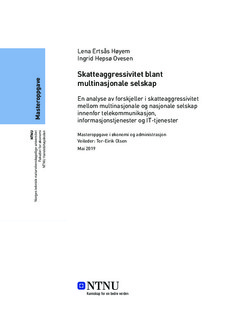| dc.contributor.advisor | Olsen, Tor-Eirik | |
| dc.contributor.author | Høyem, Lena Ertsås | |
| dc.contributor.author | Ovesen, Ingrid Hepsø | |
| dc.date.accessioned | 2019-09-17T14:01:03Z | |
| dc.date.available | 2019-09-17T14:01:03Z | |
| dc.date.issued | 2019 | |
| dc.identifier.uri | http://hdl.handle.net/11250/2617294 | |
| dc.description.abstract | En stadig økende grad av globalisering åpner opp for handel på tvers av landegrenser. Dette
skaper grobunn for etablering av flere multinasjonale selskap. Da forskjellige land opererer
med ulike skattesystemer vil multinasjonale selskap ha mulighet og incentiv til å opptre
skatteaggressivt, som igjen medfører tapte skatteinntekter for velferdsstaten. Det jobbes både
nasjonalt og internasjonalt med å utforme skatteregler som gir en riktigere beskatning av
multinasjonale selskap. Et tiltak som imidlertid er innført er innstrammingen av regelverket
for internprising og overskuddsflytting i 2008. Studien motiveres av nevnte forhold, og på
bakgrunn av dette formuleres følgende problemstilling:
Er det signifikant forskjell i skatteaggressivitet mellom norske nasjonale og
multinasjonale selskap innenfor telekommunikasjon, informasjonstjenester og
IT-tjenester, og øker skatteaggressiviteten blant multinasjonale selskap innenfor
bransjene over tid?
I denne studien forsøker vi å fange opp skatteaggressivitet i form av overskuddsflytting ved
bruk av internprising. For å undersøke problemstillingen har vi utviklet to hypoteser med
utgangspunkt i agentteorien og tidligere forskning. Den første hypotesen antar en høyere
skatteaggressivitet blant multinasjonale selskap enn nasjonale selskap i nevnte bransjer, mens
den andre antar en økning i skatteaggressiviteten blant multinasjonale selskap i perioden fra
2009 til 2017. Hypotesene testes ved hjelp av multiple regresjonsanalyser, hvor det
kontrolleres for andre forhold som kan påvirke skatteaggressiviteten. Funnene indikerer at
multinasjonale selskap er mer skatteaggressive enn nasjonale selskap innen nevnte bransjer.
På bakgrunn av resultatene og reduksjonen i nominell skattesats kan vi derimot ikke påstå en
økning i skatteaggressivitet blant multinasjonale selskap i perioden 2009 til 2017.
Studiens funn kan bidra til å belyse problematikken rundt beskatning av multinasjonale
selskap, og gi indikasjoner på om tidligere tiltak for å begrense skatteaggressiviteten har
fungert. Funnene kan derfor være retningsgivende for utforming av nye skatteregler, og
derigjennom bidra til å redusere tapet av fremtidige skatteinntekter. | |
| dc.description.abstract | Globalisation enables companies to interact across borders, which increases the number of
multinational companies. Different tax systems provide multinational companies with
opportunities and incentives for tax aggressive behaviour. International and national tax
authorities are currently developing tax regulations in order to achieve a more appropriate
taxation of multinational companies, for example the restriction of rules for transfer pricing
and profit shifting, applied by The Norwegian Tax Administration in 2008. Based on the
factors mentioned above, the following research question has been developed:
Is there a significant difference in tax aggressiveness between Norwegian national and
multinational companies in telecommunication, information service activities and
computer programming, consultancy and related activities, and does the tax
aggressiveness among multinational companies in these industries increase over time?
This study attempts to capture multinational companies’ tax aggressiveness related to transfer
pricing as a mean for profit shifting. We have developed two hypotheses based on agency
theory and previous research in order to examine the research question. The first hypothesis
assumes higher tax aggressiveness among multinational companies compared to national
companies in the industries mentioned above. The second hypothesis assumes an increase in
tax aggressiveness among multinational companies from 2009 to 2017. To test the hypotheses
we use multiple regressions, where we control for other factors that may affect the tax
aggressiveness. The results indicate that multinational companies in the industries mentioned
above are more tax aggressive than national companies. Based on the results related to the
second hypothesis and the reduction in nominal tax rate, we can not claim an increase in tax
aggressiveness among multinational companies.
The findings can contribute to enlighten issues concerning taxation of multinational
companies, and indicate if previous actions to limit the tax aggressiveness have been
successful. The results can therefore provide useful insights for designing new tax regulations,
and in this respect reduce the loss of future tax revenues. | |
| dc.language | nob | |
| dc.publisher | NTNU | |
| dc.title | Skatteaggressivitet blant multinasjonale selskap | |
| dc.type | Master thesis | |
